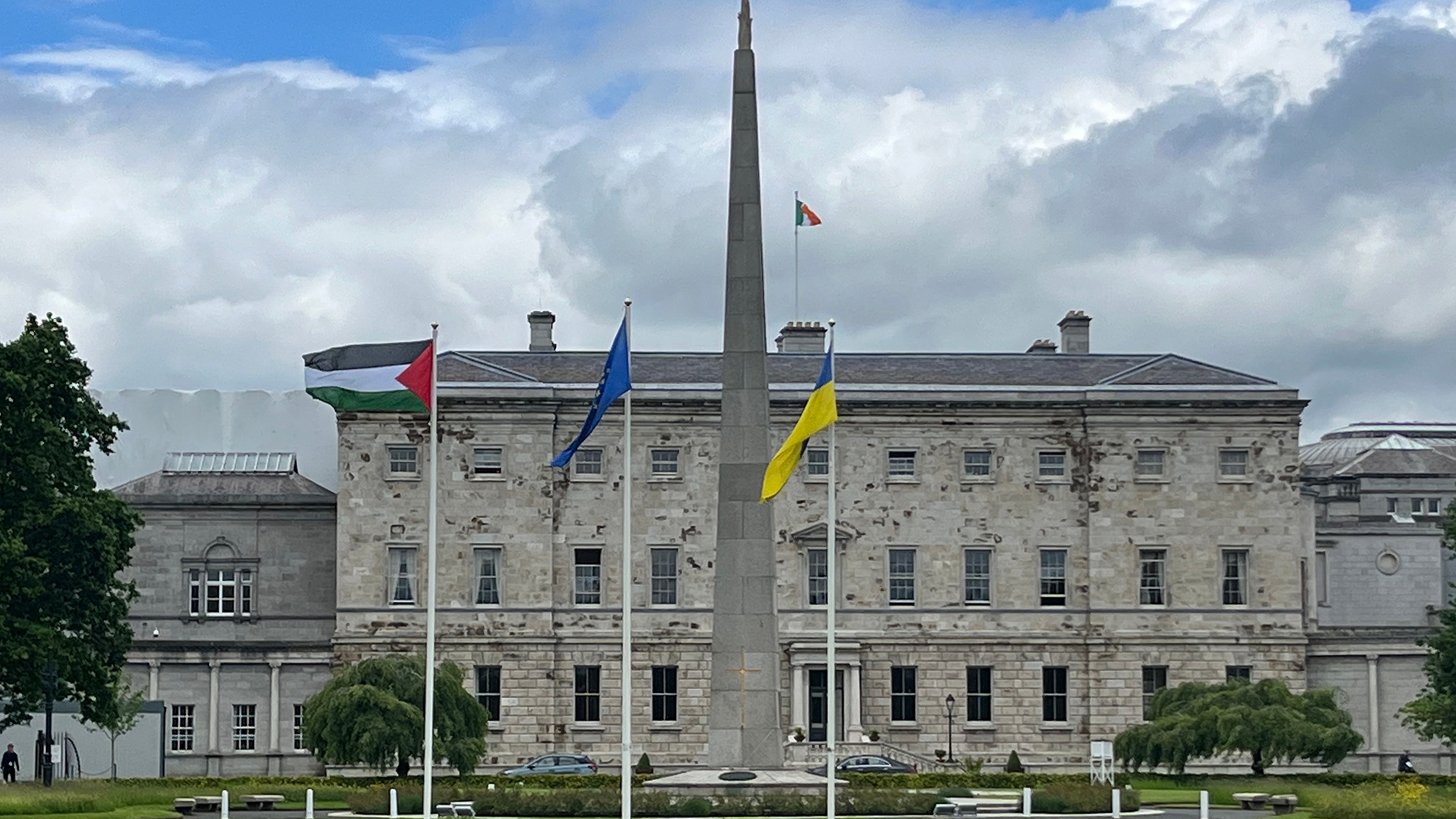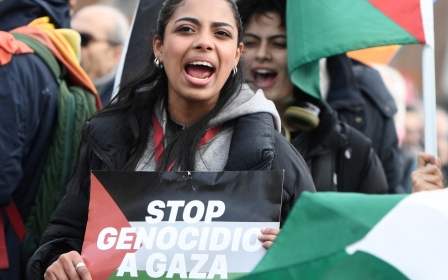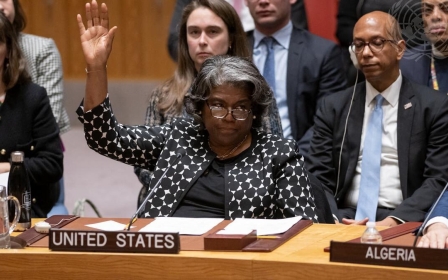Instead of recognising 'Palestine', countries should withdraw recognition of Israel

On Tuesday, three additional European states officially recognised a non-existent Palestinian state. Ireland, Spain, and Norway are the latest to join more than 140 other United Nations members in recognising this phantom entity.
The Palestinian Authority, which was set up in 1993 to aid Israel in suppressing Palestinian resistance to Israeli colonisation and occupation, welcomed the expansion of this improbable club.
Other European states like Belgium, Malta, and Slovenia also threatened to follow suit.
The Israelis, who have denied Palestinians the right to a state since 1948, reacted angrily to this largely symbolic move.
However, as I will show, international recognition of a phantom Palestinian state has been one of the main ways that UN members insist, in violation of UN regulations, on recognising Israel's right to remain a Jewish supremacist racist state.
New MEE newsletter: Jerusalem Dispatch
Sign up to get the latest insights and analysis on Israel-Palestine, alongside Turkey Unpacked and other MEE newsletters
Denying Palestinian independence
Soon after the British occupied Palestine in late 1917, the Palestinians demanded - and were denied - their independence. But it was not until 1937 that a proposal explicitly denying the Palestinians their own state was advanced.
The British Peel Commission recommended the partition of Palestine between the Jewish colonists and the then-young state of Transjordan.
Headed by Lord Robert Peel, the commission further recommended the expulsion of a quarter of a million Palestinians from the area designated as the Jewish settler-colonial state and the outright confiscation of their property. The remainder of Palestine and the Palestinians would be annexed to Transjordan.
The Peel Report was shelved due to outrage among the Palestinians and Arab countries.
The Peel Commission recommended the expulsion of a quarter million Palestinians and the outright confiscation of their property
Next, it was the turn of the UN in 1947 to deny the Palestinians independence in all of Palestine, from the Jordan River to the Mediterranean Sea. The international body rejected the minority report of its UN Special Committee on Palestine (UNSCOP). It passed a partition resolution to divide the country between the Jewish colonists and the indigenous Palestinians.
In 1946, the population of Palestine was just under two million people, at 1,972,000. Palestinians comprised nearly 70 percent at 1,364,000, while 608,000 Jewish colonists made up the rest.
The UN Resolution 181, known as the Partition Plan, proposed two states, each of which would have upheld an indigenous Palestinian majority, as would Jerusalem, which was supposed to fall under UN jurisdiction.
According to the plan, the population of the Palestinian state would consist of 818,000 Palestinian Arabs and less than 10,000 Jewish colonists, one percent of the entire population. The proposed Jewish state would consist of 499,000 Jewish colonists and 509,000 Palestinians, whereby the Palestinians would make up 54 percent of the population.
These figures led the UN to redraw the map and remove the populous city of Jaffa with its 71,000 Palestinians from the proposed Jewish settler-colonial state and include it as an enclave in the Palestinian state.
This remapping reduced the number of Palestinians in the Jewish settler-colony to 438,000 or 46.7 percent of the population. The UN corpus separatum of Jerusalem, which lay outside the two states, included 105,000 Palestinians and 100,000 Jews.
An illegal act
The Partition Plan clearly stated that in either state "no discrimination of any kind shall be made between the inhabitants on the ground of race, religion, language or sex" and that "no expropriation of land owned by an Arab in the Jewish State (by a Jew in the Arab State)…shall be allowed except for public purposes. In all cases of expropriation, full compensation as fixed by the Supreme Court shall be paid previous to dispossession".
By the time the Israeli "Declaration of the Establishment of the State of Israel" was issued on 14 May 1948, the Zionist forces had already expelled about 400,000 Palestinians from their lands, and they would expel another 360,000 in the following months.
The Zionists realised that the best way to ensure Jewish supremacy in their state was not only to expel the Palestinians and confiscate their property, but also to conquer the land of the projected Palestinian state and Jerusalem, expel their population, and confiscate their lands.
That this was an outright violation of the Partition Plan was recognised by the UN General Assembly (UNGA) when Israel applied to become a member in 1949.
Follow Middle East Eye's live coverage of the Israel-Palestine war
The UNGA insisted that to approve Israel's application, Israel would have to abide by its resolutions, including the Partition Plan and the December 1948 UNGA Resolution 194, which demanded that Israel allow the return of the Palestinians it expelled and return their property, withdraw from internationalised West Jerusalem, and declare borders for its new state.
Israel gave assurances that it would adhere to these terms after negotiations with its neighbours, which it claimed could only proceed after it became a UN member. The UNGA finally admitted Israel as a member on 11 May 1949 by a 37-12 vote, adopting UNGA Resolution 273. Despite the resolution stipulating that Israel must abide by Resolutions 181 and 194, it has yet to do so.
At the time, nine countries, including the United Kingdom, abstained.
Soon after the UN recognised Israel, Israeli Prime Minister David Ben-Gurion unilaterally annexed West Jerusalem on 5 December 1949 and declared that Israel was no longer bound by Resolution 181 as it pertained both to the Palestinian territories it had conquered and the UN control of West Jerusalem.
The UN General Assembly issued Resolution 303 four days later, declaring that Jerusalem would be placed under a permanent international regime. It never was. Israel also began to legislate racist Jewish supremacist laws, starting in July 1950 with its "law of return" that applied to Jews anywhere in the world but not to the Palestinians that Israel expelled. Such laws have multiplied to the tune of more than 65 today.
All of this is to say that the very establishment of Israel remains an illegal act and in violation of the very UN resolutions that proposed its establishment. Yet one of the many prevailing ironies of western mainstream discourse on Israel and the Palestinians is how Israeli and western denial of the Palestinians' right to their own state is accepted as a legitimate political position while denying Israel's "right to exist" as a racist Jewish supremacist state is condemned as "genocidal" or "antisemitic".
In 1988, the PLO implicitly recognised the right of Israel to exist as a Jewish supremacist state when its parliament in exile declared the "independence" of a Palestinian state in the West Bank, Gaza, and East Jerusalem. And it would do so explicitly when it signed the Oslo Accords five years later.
Since the PLO declaration in 1988, the phantom Palestinian state began to garner recognition from UN members as it did last week.
But that state never materialised, and international consensus has emerged recognising Israel as a racist apartheid state since 1948 - as attested to by Amnesty International and Human Rights Watch, among others.
Given the ongoing accusations by the pro-Israel camp, the question that arises in the matter of state recognition for Israeli Jews and Palestinians is which position, in fact, upholds racism and which one upholds anti-racism?
Withdrawing recognition
Since 1948, Israel has refused to recognise the right of the Palestinian people to their own state and did everything it could to prevent its establishment.
Indeed, this is a position that Israeli leaders continue to uphold. Benjamin Netanyahu does not tire of repeating his rejection of the establishment of a Palestinian state, and neither does his defence minister, Yoav Gallant, who affirmed that such a state would never be allowed to exist now or under any future Israeli government.
I have yet to see any description by any western official or the western press of such denial of the right of the Palestinian people to exist in their own state as genocidal or racist.
Israel, on the other hand, was established on the lands of the Palestinian people in 1948, whether on the territory it was granted by the General Assembly in the Partition Plan of November 1947 or on half the territory granted to the Palestinian state that it occupied between May and December 1948.
Yet those Palestinians who reject Israel's "right to exist" as a Jewish supremacist state that rules with a battery of racist laws, and demand that a decolonised democratic state, from the river to the sea, is established in its stead, are immediately accused of being "genocidal" against the Jewish people.
Meanwhile, the only people subjected to genocide in Palestine have been the Palestinians.
In this vein, it is worth noting that the aptly named Gallant was given his first name, "Yoav", by his Polish colonist parents after the Israeli army's "Yoav Operation" in southern Palestine, in which his father fought during the 1948 Zionist conquest.
During this operation, the Israelis occupied lands of the projected Palestinian state. They committed the horrific massacre of al-Dawayima in which more than 200 Palestinian civilians, including women and children, were slaughtered.
Gallant's insistence today on denying the right of the Palestinians to a state is consistent with his support of Israel's 1948 occupation of their lands during military operations that his own name perpetuates.
The US and its European allies have always insisted that Israel's right to be a Jewish supremacist state is not subject to any negotiation between the Israelis and the Palestinians, who should only negotiate the possibility of a Palestinian state on some truncated territory.
Therefore, the outright racists are those who recognise Israel's right to exist as a Jewish supremacist state, as they insist that this illegal state should continue to benefit from its ethnic cleansing of the Palestinian people from 1948 onwards and be allowed to maintain its battery of racist laws and institutions.
The anti-racists are, in fact, those who support the dismantlement of Israel's racist structures and laws and advocate for one decolonised state, from the river to the sea, in which everyone living within it is equal before the law and does not benefit from any racial, ethnic, or religious privileges.
When UN member states recognise a phantasmic Palestinian state, all they are doing is buttressing Israel's illegality as an institutionally racist state. What they need to do is not recognise a Palestinian state but withdraw their recognition of Israel. Only that will lead to a decolonised anti-racist and democratic outcome.
The views expressed in this article belong to the author and do not necessarily reflect the editorial policy of Middle East Eye.
Middle East Eye delivers independent and unrivalled coverage and analysis of the Middle East, North Africa and beyond. To learn more about republishing this content and the associated fees, please fill out this form. More about MEE can be found here.






